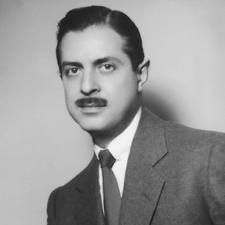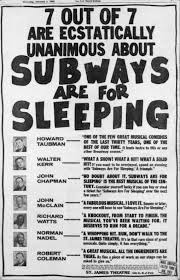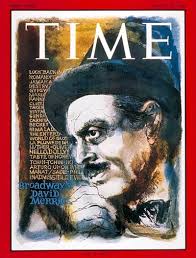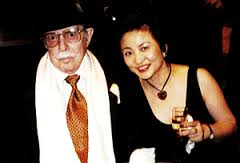David Merrick, who was born David Lee Margulois in St. Louis, Missouri, in 1911, was a lawyer who in 1940 turned to theatre, becoming one of the most successful producers that Broadway has ever seen. Bombastic, savvy, and cunning, Merrick was a master of publicity, generating positive news and spin about his shows even when they had received negative reviews. Merrick was a one-of-a-kind showman, who saw the producer’s role as directly being part of the “show” in show business.
Merrick’s Masterful Manner
David Merrick was a master at generating publicity and at producing Broadway shows. With well over fifty Broadway productions over the span of about 40 years, he managed to always have a hit on his hands. And if he didn’t have a hit, then he was busy coming up with a way to get people to buy tickets to a show that might otherwise close.
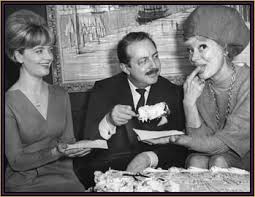
Florence Henderson, left, and Carol Channing, right, celebrating Merrick’s 10th anniversary as a Broadway producer.
He was also an eclectic producer. At one moment he’d be getting the Broadway premiere of the Peter Weiss play The Persecution and Assassination of Jean-Paul Marat as Performed by the Inmates of the Asylum of Charenton Under the Direction of the Marquis de Sade (Marat/Sade) on the stage, and the next, he’d be opening the Jerry Herman/Michael Stewart musical Hello, Dolly!
He was prodigious and unrelenting. The volume of work he produced at times was overwhelming. At the Tony Awards, Merrick was often in competition with himself. As an example, in 1963, he produced Oliver!, Luther, 110 in the Shade, and One Flew Over the Cuckoo’s Nest. At the Tonys that year, two of his shows, Oliver! and Stop the World I Want to Get Off (produced in 1962) were nominated for Best Musical. The next year, 1964, Luther was nominated as Best Play and Hello, Dolly! as Best Musical and both won.
Big and Bigger
Merrick seemed to do everything big. He was married six times and divorced five. His wives were Lenore Beck, Jeanne Gibson, Etan Aronson (twice married and divorced), Karen Prunczik, and Natalie Lloyd. He was married to Lloyd at the time of his death in 2000.
Of course, his publicity stunts are mythological, and they often drew a lot of attention. One of his most famous involved the musical Subways Are for Sleeping (1961). The musical has opened and received bad reviews. Merrick invited seven people from the environs of New York to see the show. What made each of these attendees unique is that each has the same name as one of the seven most prominent NY theatre reviewers of the time.
Thus, when the aptly named Howard Taubman, Walter Kerr, John Chapman, John McClain, Richard Watts, Jr., Norman Nadel, and Robert Coleman saw the show, Merrick asked each if he could use their images and names in an ad for Subways Are for Sleeping. In the advertisement, which ran in one edition of the New York Herald Tribune, there were quotes raving about the show attributed to the men who happened to have the same names as the reviewers. The stunt drew a lot of press and Subways Are for Sleeping extended its run for 205 performances, or about six months.
One of the most famous, and perhaps infamous, incidents occurred on August 25, 1980. That was opening night of 42nd Street. The show’s director, Gower Champion, had been hospitalized while the musical was in previews and the morning of opening, he died in the hospital from a rare form of cancer. Merrick kept a lid on the news and announced Champion’s death during the opening night curtain call to a stunned cast, crew, and audience. It garnered a lot of publicity and made some wonder about what appeared to some to be the manipulative motive behind Merrick’s emotional announcement.
Career Highlights
In the course of his career, David Merrick garnered 37 Tony nominations, and received 2 Special Tonys and 9 others. His productions included some of the most legendary, such as 42nd Street (1980), Tom Stoppard’s Travesties (1976) and his Rosencrantz and Guildenstern Are Dead (1968), Oliver! (1963), Hello, Dolly! (1964), and John Osborne’s Look Back in Anger (1958).
He was also the man behind some major Broadway’s failures, including Breakfast at Tiffany’s (1964), Foxy (1966), and The Milk Train Doesn’t Stop Here Anymore (1963).
From 1958 to 1973, he always had at least one Tony nomination and in all but seven of those years 26 theatre seasons, he had multiple nominations. Merrick was the ultimate showman and producer, willing to take risks and doing just about anything that he could to make them pay off. David Merrick, they simply don’t make producers like him anymore.

